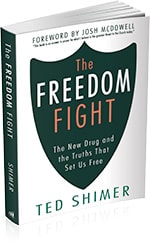
is an
answer
to prayer!” – Josh McDowell Author and Speaker
Understand Porn’s Effects on Females
Pornography isn’t just a guy problem. More and more women are watching porn and getting addicted to it. There is shame with any addiction, but especially for the Christians who struggle with a porn habit. That shame is even heavier for women, since the stereotype is that porn is a male issue. Women are just as impacted by the negative effects of porn as men. The good news is, men and women both can walk the same path to freedom.
Women are less likely to admit their struggle and get help. The shame and fear of judgement keeps them in the shadows. Researchers like Samuel Perry suspect that’s why Christian women tend to under report their porn use. A survey found that the numbers of women who watch porn are higher than many of us realize, and the real stats are likely even higher.
Women who view porn at least once a month:
The trend of younger women being more likely to watch porn is also reflected in the statistics about men. Young people are struggling with pornography use now more than ever, no matter their gender.

The massive increase in pornography consumption is not just among young women, but among young Christian women. Freedom Fight’s recent Survey of over 500 Christian college women from over thirty US campuses showed that nearly half are watching porn. These aren’t just any college women. These women are involved in campus ministry, and many of them are in leadership positions. Though their faith is important to them, pornography is also a part of their lives.
“I first encountered pornography when I was thirteen. I hadn’t gone looking for it. It found me. Within weeks, I was hooked. The next four years dragged me deeper into the toxic filth of immorality. It wasn’t an occasional thing; it was an everyday thing. It was an every spare moment thing. It was a stay-up-all-night-so-I-can-do-this thing. No matter what I tried, I could not stop.”
– Jessica Harris on being captured by porn as a young Christian
 Most women start watching porn out of curiosity and to get sexual stimulation. But it often escalates to become a place they go to escape stress, depression, anxiety, or boredom. Porn has an instant effect on the human body and mind, even if the user disapproves of what they are seeing. Many women find their body is saying yes, even though their mind may be saying no – and this multiplies the shame and self disgust. Beyond the sexual stimulation, women can be drawn to the fake intimacy of pornography. Fantasizing about being the actresses in porn allow them to feel wanted and desirable. This fake intimacy gives porn an extra pull especially when a person is lonely.
Most women start watching porn out of curiosity and to get sexual stimulation. But it often escalates to become a place they go to escape stress, depression, anxiety, or boredom. Porn has an instant effect on the human body and mind, even if the user disapproves of what they are seeing. Many women find their body is saying yes, even though their mind may be saying no – and this multiplies the shame and self disgust. Beyond the sexual stimulation, women can be drawn to the fake intimacy of pornography. Fantasizing about being the actresses in porn allow them to feel wanted and desirable. This fake intimacy gives porn an extra pull especially when a person is lonely.
Watching porn often opens a door to other sexual activities like hooking up. When a man pursues a woman, even for a hookup, it can make her feel loved and wanted and special. A guy is typically focused on the sex related to a hook up, where a woman typically involves more of the emotional component as well. Research has shown that increasing pornography consumption directly increased the value people attached to casual sex and hook-ups. Those who watched more porn also placed a decreased value on marriage, the desire for children, and the need for faithfulness in a relationship. Those who watched more porn believed sexually deviant behavior is more common than it actually is. The study suggests that when something is normalized in a person’s mind they are more likely to practice it.
The principles of recovery that lead to freedom apply to male and female porn addicts the same. The core roots must be addressed that drive the addiction. In our program, we address the six roots that drive a porn addiction. If these roots are not addressed effectively the addiction will likely return. Going through recovery but not addressing these roots is like mowing a yard full of weeds, it looks great at first but the weeds always come back because the roots weren’t dealt with. Confronting these roots requires growth and development in key areas of one’s life.

Here are six roots of a porn or sex addiction and the area of growth required to overcome them:
Don’t underestimate how God will use the process of freeing you from porn to grow, develop and disciple you as a whole person. The Freedom Fight systematically works through each of these roots, giving a biblical, gospel-centered and clinical approach to recovery.
 Many Christian women are distraught when they discover that their boyfriend or husband is watching porn. Wives typically view porn use as Jesus did–as adultery. Jesus is clear that lusting in your heart after a woman who is not your wife is adultery. This feels like betrayal, especially if there has been lying and deceit to cover it up. The person who was supposed to be your protector has become your betrayer and it feels very unsafe. A wife’s response to this situation is a crucial part of the husband finding freedom. For more on this topic see the Married Couples section.
Many Christian women are distraught when they discover that their boyfriend or husband is watching porn. Wives typically view porn use as Jesus did–as adultery. Jesus is clear that lusting in your heart after a woman who is not your wife is adultery. This feels like betrayal, especially if there has been lying and deceit to cover it up. The person who was supposed to be your protector has become your betrayer and it feels very unsafe. A wife’s response to this situation is a crucial part of the husband finding freedom. For more on this topic see the Married Couples section.
Maggie was disgusted with her out-of-control porn habit. She was a Christian, a virgin, and addicted to violent porn. She went to a counselor who told her that sometimes the genre of porn a person is attracted to can reveal a deeper issue. After multiple sessions with the counselor it was clear Maggie was drawn to the shame, abuse, and rejection that the actresses endured in porn. Maggie realized these were the emotions she first felt when her father had abandoned her.
For Maggie, watching violent porn was a way she could control her pain instead of letting her pain control her. Trauma reenactment is a way to try to understand and master the traumatic experience. Many trauma survivors don’t feel fully alive unless they repetitively relive their trauma. Today’s pornography provides many abusive genres for trauma survivors to relive. Unfortunately, as Maggie discovered, porn provided short term relief, but ultimately only multiplied her problems.
Maggie’s shame diminished significantly when she understood trauma reenactment. This gave her courage to be honest about her struggle and bring others in. Until Maggie identified the trauma that fed her porn habit, she was only dealing with the symptoms. There was a reason she was drawn to violent porn. When the shame began to lift, Maggie started reading her Bible and praying again. She had pulled back from God because she thought He was disgusted with her. Through counseling, personal growth, and being a part of a small group, Maggie began to experience freedom. When a person understands how their porn use is serving them and meeting a deeper need, they can deal with the roots that are driving the addiction.
The Bible tells us that healing begins when we share our struggle with others, “confess your sins to one another and pray for one another, that you may be healed” (James 5:16). Confessing to a safe friend or mentor is an important first step to healing. One of the early steps we help women take is to identify their triggers and establish boundaries.
For Sophia her biggest temptations were fantasy and masturbation as well as hooking up with guys. These had been a part of her life since high school. She gained a heart for purity after she started following Christ in college. She joined a small group that helped her think through her triggers and the boundaries she needed to diffuse them. These were her boundaries.
Sophia realized the power of breaking isolation and reaching out for help when she was tempted. She resisted where she usually would not have. Identifying triggers and routines that move a person toward relapse helps them set up boundaries. Once boundaries are established, accountability is essential to help a person keep their boundaries.